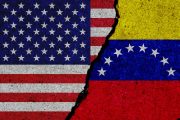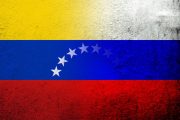The flow of Venezuelan heavy crude oil to U.S. Gulf Coast refineries dropped by 60 percent in the first three weeks of January, according to data from the U.S. Energy Information Agency (EIA). Shipments had been averaging around a million barrels a day, but they dropped to 394,000 bpd since the first of the year.
This adds to Marxist Nicolas Maduro’s financial woes, and none too soon, either. He has been relying on cash generated by those exports to continue to keep his regime in power. But now, in the famous words of Great Britain’s former Prime Minister Margaret Thatcher, “The problem with socialism is that you eventually run out of other peoples’ money.”
For Maduro “eventually” is upon him and his totalitarian dictatorship.
The news from the EIA is welcome but not surprising. Reuters reported two weeks ago that Venezuela’s crude production last year fell by 13 percent from the year before, hitting a 28-year low. This follows a six-year decline in production that tracks closely with the imposition of “Chavism,” the political ideology that wealth can be created through government edict rather than capital investment.
For a while it looked like it was working. Revenues from Venezuela’s vast crude oil reserves (among the world’s largest) allowed Hugo Chavez to expand greatly Venezuela’s welfare state, resulting in socialists around the globe declaring his country an economic miracle. But then oil revenues started declining, and Hugo Chavez died in 2013. Nicolas Maduro (a former bus driver and union organizer) took over and proceeded to run this economic “miracle” into the ground.
That country’s implosion has accelerated to the point where even statist economists can no longer deny it. Rice University professor Francisco Mondaldi, who predictably holds degrees in political science from Stanford and in international economics from Yate, told Reuters, “This is one of the worst collapses in history. It happened without an invasion like in Iraq, the breakup of a country like in the Soviet Union, or a civil war like in Libya.”
The litany of socialist destruction in Venezuela has been covered widely by The New American and elsewhere, which includes Maduro’s de facto bankruptcy through his inability even to service the interest payments on his country’s $150 billion external debt. This has forced all three credit rating agencies to declare Venezuela in default. His socialist policies have forced his country’s economic output to be cut in half since 2013, further impoverishing his serfs. That impoverishment has been reflected in the “wasting” index — an index that measures an individual’s height compared to his weight — which is hitting new highs.
Inflation of his country’s currency has just been reported by the International Monetary Fund (IMF) to be 13,000 percent, causing the price of a cup of coffee to double between the time when it is ordered and when the bill to pay for it arrives.
It appears to be just a matter of time — perhaps a matter of weeks — when Maduro’s madness will come to end. There is speculation about a military coup, an outside intervention by CIA operatives, or pressure from the country’s neighbors, which may escalate from rhetoric by U.S. Secretary of State Rex Tillerson that is expected during his trip to South America this week.
But credit must finally be given to U.S. crude oil refineries for cutting the flow of Venezuelan heavy crude, and Maduro’s resultant cash flow, in favor of other more reliable sources such as Mexico and Canada for the same product. It isn’t politics that forced those refineries to cut their imports, but simple economics: They needed a dependable, reliable, steady source of crude and, thanks to Maduro’s military takeover of his state-owned energy company PdVSA, it cannot provide it. Instead, its employees are leaving as a result of the company no longer being able to pay them, and they’re taking with them valuable supplies and equipment to sell on the black market to feed themselves and their families.
As Winston Churchill said, “Socialism is a philosophy of failure, the creed of ignorance, and the gospel of envy. It’s inherent virtue is the equal sharing of misery.” That misery will hopefully shortly come to an end, thanks partly to economic decisions by U.S. Gulf Coast refineries to do business elsewhere.
Image: Screenshot of PDVSA website
An Ivy League graduate and former investment advisor, Bob is a regular contributor to The New American magazine and blogs frequently at LightFromTheRight.com, primarily on economics and politics. He can be reached at [email protected].
Related article:
Venezuela’s Oil Production Collapsing Along With Its Economy




